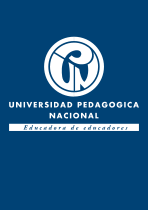Trama moral e imaginarios sociales en el aprendizaje de la Independencia de la Argentina.

Citación
Fecha
2010-07-01Autor
Ruiz Silva, Alexander
Enlace al recurso
http://revistas.pedagogica.edu.co/index.php/RF/article/view/615Palabras claves
Independencia de la Argentina
Relato oficial
Aprendizaje de la historia
Imaginarios sociales
Identificación nacional
Sentimientos morales
Maniqueísmo
Esencialismo nacional y legitimación moral
Keyword
Argentina's IndependenceThe official story
Learning history
Social imaginaries
National identity
Moral sentiments
Manicheism
Essentially national and moral legitimacy
Metadatos
Mostrar el registro completo del ítemResumen
El presente análisis se centra en los relatos sobre la Independencia que realizan los jóvenes de sectores marginales del conurbano bonaerense; se basa en la exploración de la orientación moral de sus aprendizajes e imaginarios de nación; en el papel que le atribuyen a la voluntad y al destino a la hora de explicar el origen y configuración de la misma; además de un examen de los elementos emotivos (sentimientos morales) e ideológicos presentes en sus comprensiones; los valores que configuran el constructo nosotros nación, y la manera como se articulan narrativamente en relatos fundacionales. Los relatos analizados dejan ver trazos de esencialismo moral, dirigido a la identificación acrítica con la propia nación, y excluyen rasgos de naturaleza social o política del pasado colectivo que contribuirían a una comprensión más compleja de la historia en la escuela. La moral sacrificial, otro rasgo a destacar dentro de los relatos, podría estar contribuyendo a justificar y enaltecer a los sujetos del presente que padecen las consecuencias más graves de la desigualdad social, lo que quizás podría desnaturalizarse desde una enseñanza de la historia en la que las orientaciones morales de lo que se aprende puedan ser sometidas a deliberación.
Abstract
This analysis focuses on stories of young people from marginalized sectors of the Buenos Aires province about the independence of their nation. The research on which the study is based explored the moral guidance of their learning and their nation imaginary, the role attributed to will and fate in their configuration, the emotional elements (moral feelings) that take part in their ideological understandings; the values that predominantly make up the “our nation” construct and how these values are narratively articulated in a foundational story. The stories analyzed indicate traces of moral essentialism leading to an uncritical identification with the nation itself and the exclusion of social or political features of the collective past that would contribute to a more complex understanding of history in school. The sacrificial moral, another remarkable feature found in the stories, could be contributing to justify and magnify subjects from present times that support the most serious burden of social inequality. This, perhaps, may be put into question in schools by means of a history teaching in which the moral guidance of what is learned can be subjected to deliberation.
Editorial
Editorial Universidad Pedagógica Nacional
Fuente
Colecciones
- Revista Folios [571]
